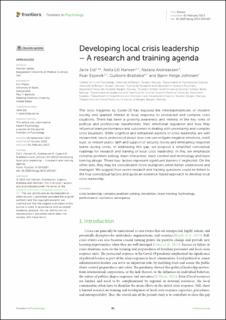| dc.contributor.author | Eid, Jarle | |
| dc.contributor.author | Hansen, Anita Lill | |
| dc.contributor.author | Andreassen, Natalia | |
| dc.contributor.author | Espevik, Roar | |
| dc.contributor.author | Brattebø, Guttorm | |
| dc.contributor.author | Johnsen, Bjørn Helge | |
| dc.date.accessioned | 2023-08-15T11:53:21Z | |
| dc.date.available | 2023-08-15T11:53:21Z | |
| dc.date.created | 2023-02-28T17:50:59Z | |
| dc.date.issued | 2023 | |
| dc.identifier.issn | 1664-1078 | |
| dc.identifier.uri | https://hdl.handle.net/11250/3084142 | |
| dc.description.abstract | The crisis triggered by Covid-19 has exposed the interdependencies of modern society and sparked interest in local response to protracted and complex crisis situations. There has been a growing awareness and interest in the key roles of political and professional stakeholders, their emotional regulation and how they influence team performance and outcomes in dealing with uncertainty and complex crisis situations. While cognitive and behavioral aspects of crisis leadership are well researched, less is understood about how one can mitigate negative emotions, instill trust, or restore public faith and support of security forces and emergency response teams during crises. In addressing this gap, we propose a simplified conceptual roadmap for research and training of local crisis leadership. In this, we emphasize complex problem solving, team interaction, team context and technology and team training design. These four factors represent significant barriers if neglected. On the other side, they may be considerable force multipliers when better understood and managed. We suggest how seven research and training questions could be linked to the four conceptual factors and guide an evidence-based approach to develop local crisis leadership. | en_US |
| dc.language.iso | eng | en_US |
| dc.publisher | Frontiers | en_US |
| dc.rights | Navngivelse 4.0 Internasjonal | * |
| dc.rights.uri | http://creativecommons.org/licenses/by/4.0/deed.no | * |
| dc.title | Developing local crisis leadership – A research and training agenda | en_US |
| dc.type | Journal article | en_US |
| dc.type | Peer reviewed | en_US |
| dc.description.version | publishedVersion | en_US |
| dc.rights.holder | Copyright 2023 The Author(s) | en_US |
| dc.source.articlenumber | 1041387 | en_US |
| cristin.ispublished | true | |
| cristin.fulltext | original | |
| cristin.qualitycode | 1 | |
| dc.identifier.doi | 10.3389/fpsyg.2023.1041387 | |
| dc.identifier.cristin | 2130226 | |
| dc.source.journal | Frontiers in Psychology | en_US |
| dc.identifier.citation | Frontiers in Psychology. 2023, 14, 1041387. | en_US |
| dc.source.volume | 14 | en_US |

